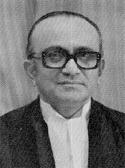P. N. Bhagwati facts for kids
Quick facts for kids
Prafullachandra Bhagwati
|
|
|---|---|
 |
|
| 17th Chief Justice of India | |
| In office 12 July 1985 – 20 December 1986 |
|
| Appointed by | Giani Zail Singh |
| Preceded by | Y. V. Chandrachud |
| Succeeded by | R. S. Pathak |
| Governor of Gujarat (acting) | |
| In office 17 March 1973 – 4 April 1973 |
|
| Preceded by | Shriman Narayan |
| Succeeded by | K. K. Viswanathan |
| Chief Justice, Gujarat High Court | |
| In office 16 August 1967 – 17 July 1973 |
|
| Governor of Gujarat (acting) | |
| In office 7 December 1967 – 26 December 1967 |
|
| Preceded by | Nityanand Kanungo |
| Succeeded by | Shriman Narayan |
| Personal details | |
| Born |
Prafullachandra Natwarlal Bhagwati
21 December 1921 Ahmedabad, Bombay Presidency, British India |
| Died | 15 June 2017 (aged 95) New Delhi, India |
| Spouse | Prabhavati Shethji |
| Children | 3 |
| Parent |
|
| Relatives | Jagdish Bhagwati (brother) Padma Desai (sister-in-law) Shardul S. Shroff (son-in-law) |
| Alma mater | Bombay University, Government Law College, Bombay |
Prafullachandra Natwarlal Bhagwati (21 December 1921 – 15 June 2017) was a very important judge in India. He served as the 17th Chief Justice of India from 1985 to 1986.
Justice Bhagwati is famous for bringing in new ideas to the Indian legal system. These include "public interest litigation" and "absolute liability." Because of these changes, he is seen as a leader in making the courts more active in protecting people's rights, a concept known as "judicial activism." He was also the longest-serving judge in the Supreme Court of India.
Contents
Early Life and Education
P. N. Bhagwati was born in Gujarat, India. His father, Natwarlal H. Bhagwati, was also a judge in the Supreme Court. Prafullachandra had a famous brother, Jagdish Bhagwati, who is a well-known economist.
He studied in Mumbai, getting a degree in Mathematics from Bombay University in 1941. During the Indian independence movement, he supported the fight for India's freedom. Later, he earned a law degree from Bombay University after studying at Government Law College, Bombay.
Legal Career and Contributions
Justice Bhagwati started his career as a lawyer at the Bombay High Court. In 1960, he became a judge of the Gujarat High Court. He later became the Chief Justice of that court in 1967. He even served briefly as the acting Governor of Gujarat on two occasions.
In 1973, he was appointed a Judge of the Supreme Court of India. He then became the Chief Justice of India in 1985.
As a Supreme Court judge, Justice Bhagwati introduced two major ideas:
- Public Interest Litigation (PIL): This allows anyone to bring a case to court if it affects a large group of people or the public's interest, even if they are not directly harmed. It helps ensure justice for the poor and disadvantaged.
- Absolute Liability: This rule states that if a dangerous activity causes harm, the person or company doing it is fully responsible for the damage, no matter what.
These ideas helped make the Indian legal system more active in protecting citizens' rights. Justice Bhagwati believed the courts had a big role to play in shaping the law. In 2007, he received the Padma Vibhushan, which is India's second-highest civilian award, for his work in public affairs.
Important Court Cases
Maneka Gandhi vs Union of India
One of Justice Bhagwati's most famous judgments was in the case of Maneka Gandhi vs Union of India. In this case, Maneka Gandhi was asked by the government to return her passport without a clear reason. She argued that this went against her Right to Freedom under Article 21 of the Constitution of India.
Justice Bhagwati, along with Justice V. R. Krishna Iyer, ruled in favor of Maneka Gandhi. This judgment was very important because it expanded the meaning of the "Right to Life and Personal Liberty" to include the right to travel abroad.
Other Activities and Legacy
Beyond his work in Indian courts, Justice Bhagwati was involved in international legal bodies. He was a member of the United Nations Human Rights Committee for many years and even served as its chairman. He also worked with the Committee of Experts of the International Labour Organization.
He was appointed Chancellor of Sri Sathya Sai Institute of Higher Learning in 2011. Justice Bhagwati passed away on 15 June 2017, at the age of 95. Many leaders, including Prime Minister Narendra Modi, expressed their sadness, calling him a "stalwart of India's legal fraternity."
 | Sharif Bey |
 | Hale Woodruff |
 | Richmond Barthé |
 | Purvis Young |

